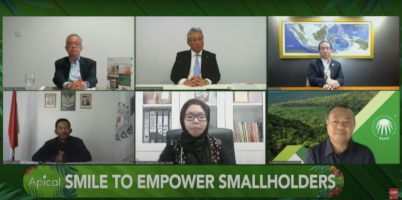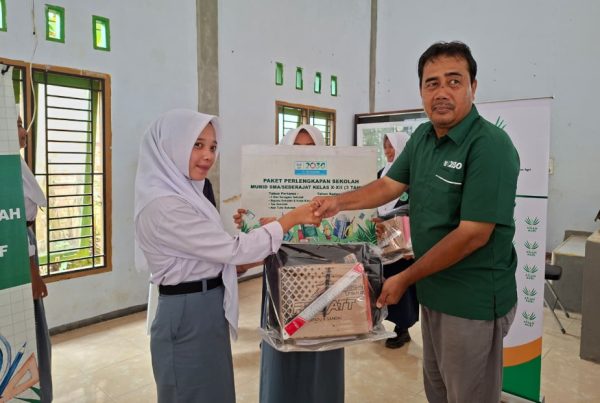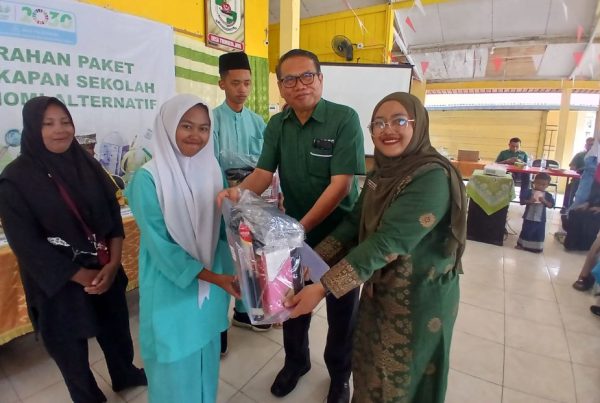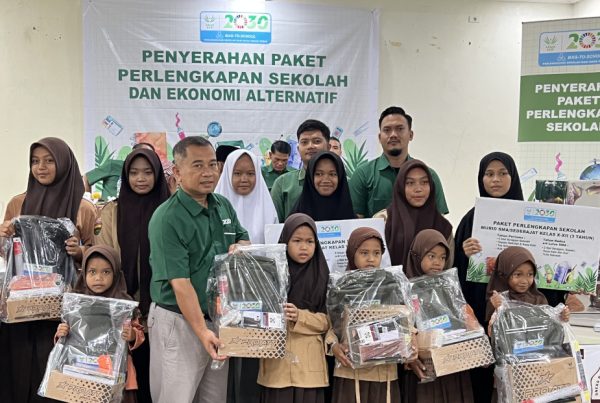Jakarta, 28 October 2020 – Three leading companies in the palm oil industry – Kao Corporation, Apical Group, and Asian Agri – shared in a special CNN webinar their insights on the important role oil palm smallholders play in the industry and the steps companies can take to elevate sustainability standards.
The webinar followed the joint launch of the new collaborative sustainability initiative SMILE, or the SMallholder Inclusion for better Livelihood & Empowerment program on 14 October 2020. SMILE aims to help independent oil palm smallholders in Indonesia improve their yields, acquire international certification, and eventually secure sales premiums from selling certified palm oil.
Aired today on CNN, the webinar ‘SMILE to Empower Smallholders’ featured an esteemed panel of speakers representing various organizations that shared perspectives on the challenges and opportunities impacting both smallholders and the industry today. Attended by over 200 representatives from the industry and media, the webinar outlined the untapped potential role smallholders have in safeguarding a sustainable supply chain as well as the benefits of partnerships in improving agronomic knowledge, yields and livelihoods.
President of Apical Group, Dato’ Yeo How said, “Smallholders today contribute about 40% to Indonesia’s palm oil production. There is an opportunity to partner with them to share industry best practices and provide resources to achieve the optimal yield from their plantations, allowing them to achieve economies of scale. It was during this time the idea of the SMILE program was conceptualized. We always strongly believed that sustainability in the industry is best addressed through close collaboration between all stakeholders. We want to drive positive engagement to bring about positive changes. SMILE is a useful platform to create mutually beneficial and long-term positive outcomes for all stakeholders as well as the palm oil industry.”
Managing Director of Asian Agri Kelvin Tio said, “SMILE seeks to bridge the knowledge gap of independent smallholders by leveraging on partnerships and invaluable experience companies such as Asian Agri have gained through supporting and working with smallholders for the last 30 years. SMILE recognizes that independent smallholders are private business owners who are challenged to increase their yield and productivity but may neither have the knowledge nor the technical expertise to do so. This is where companies can come to support them.”
Kao Corporation Managing Executive Officer Negoro Masakazu said, “Kao uses about five hundred thousand (500,000) tons of palm kernel oil per year, which accounts for about 7% of palm kernel oil produced in Indonesia and Malaysia. To fulfill our responsibility as one of large palm oil consumers and to help resolve issues related to palm oil industry in Indonesia, Kao has launched the SMILE project with Apical and Asian Agri. We will provide farmers with Kao’s surfactant called “Adjuvant” along with technical guidance on its effective use. This Adjuvant can decrease the amount of pesticide applied while boosting its effects. Through improvement of yield of independent smallholders and achieving RSPO certification, we believe it can lead to no-exploitation for new plantations, help prevent environmental destruction and enhance independent smallholders’ livelihoods. We hope that other Japanese manufacturers will also step up such efforts, step by step. With more companies taking on these kinds of activities, we can move steadily toward addressing these challenges”.
Chief Operating Officer of RSPO, Bakhtiar Talhah added, “We are thankful to our members and implementing partners like Kao, Apical and Asian Agri for helping these smallholders achieve RSPO certification through capacity building, good agricultural practices, or the purchase of RSPO Credits. Through the spirit of shared responsibility, we invite more companies to champion the new RSPO Independent Smallholder Standard to increase smallholder inclusion in the sustainability agenda to enhance their livelihoods and provide greater access to international markets.”
The national farmer’s association (H. Sutoyo, Ketua Asosiasi Anugrah), and Setara Jambi (Nurbaya Zulhakim, Director) were also in attendance in the webinar. The webinar may be accessed here: https://youtu.be/A1yXq_73JnY
About Kao:
Kao creates high-value-added products that enrich the lives of consumers around the world. Through its portfolio of over 20 leading brands such as Attack, Bioré, Goldwell, Jergens, John Frieda, Kanebo, Laurier, Merries and Molton Brown, Kao is part of the everyday lives of people in Asia, Oceania, North America and Europe. Combined with its chemical division, which contributes to a wide range of industries, Kao generates about 1,500 billion yen in annual sales. Kao employs about 33,000 people worldwide and has 130 years of history in innovation.
Combined with its chemical division, which contributes to a wide range of industries, Kao generates about 1,500 billion yen in annual sales. Kao employs about 33,000 people worldwide and has 130 years of history in innovation.
For more information, please visit the Kao Group website: https://www.kao.com/global/en/
The Kao Group ESG Initiatives:
Recognizing its responsibility as an enterprise that provides products which people use on a regular basis in their daily lives, the Kao Group takes active steps to reduce the environmental footprint of its products throughout the entirety of the product lifecycle. The Kao Group has received evaluation from many external organizations such as “Dow Jones Sustainability World Index” (DJSI World), which selects companies with excellent sustainability performance, developed by S & P Dow Jones in the United States and Robeco SAM in Switzerland. In April 2019, Kao launched the Kirei Lifestyle Plan, its ESG strategy, which incorporates 19 key leadership actions. By integrating ESG into the core of its company management, Kao will drive business growth and better serve consumers and society through its enhanced products and services. This particular project forms part of the Responsibly Sourced Raw Materials action, one of the Kirei Lifestyle Plan’s 19 key leadership actions.
With regard to palm oil procurement, which is the category of raw material procurement that has the largest environmental footprint over the entire product lifecycle, Kao has developed the Sustainable Palm Oil Procurement Guidelines. Besides demonstrating support for reducing forest destruction to zero, Kao is also promoting sustainable procurement that takes ethical issues into account, and is implementing effective traceability. Kao is a member of the Roundtable on Sustainable Palm Oil (RSPO) since 2007, and completed the acquisition of SCCS certification for Kao’s all plants in 2018. Kao is also one of directors of the Japan Network for Sustainable Palm Oil (JaSPON), which was established in 2019.
In the SMILE program, Kao plans to provide farmers with its functional agrochemical adjuvant*4, which helps to boost productivity while also reducing the burden on the environment, along with technical guidance on how to use the product effectively with Apical and Asian Agri. Kao is also collaborating with NGOs and local NPOs to implement questionnaire surveys and analysis regarding how effective the support being provided is in terms of boosting productivity and improving smallholders’ working environment, and regarding any areas where further improvements could be made.
*4 Kao has developed the Adjuvant series, a new type of vegetable oil based, high-wettability agrochemical spreader, which is designed to be particularly effective on highly waxy plants that droplets of agrochemicals tend to bounce off when the agrochemicals are being applied; in this way, the agrochemical adheres better to the plant surface and the agrochemical can be applied to the crop more rapidly.
■ Kao > Sustainability > Responsibly Sourced Raw Materials https://www.kao.com/global/en/sustainability/topics-you-care-about/procurement/
■ Kao launches new ESG Strategy “Kirei Lifestyle Plan” to support consumer lifestyle changes https://www.kao.com/global/en/news/sustainability/2019/20190422-001/
About Apical:
Apical Group is one of the largest exporters of palm oil in Indonesia, owning and controlling an extensive spectrum of the palm oil business value chain from sourcing to distribution. It also engages in the refining, processing and trading of palm oil for both domestic use and international export. Its operations are located in Indonesia, China and Spain, and include five refineries, three biodiesel plants, an oleo chemical plant and a kernel crushing plant.
Apical’s business is built on a broad sourcing network in Indonesia with integrated refinery assets at strategic locations. These are strengthened by efficient logistic channels supported by Apical’s own infrastructure to deliver to a wide range of clients from international trade houses to local industrial buyers. With its unique business model, Apical has been able to control product quality and address sustainability and food safety issues, while running highly efficient operations at its world-class refineries and integrated storage and bulking facilities.
For more information, please visit the Apical website
Apical Group Sustainability:
Since launching the Apical Sustainability Policy 2014, Apical has made strides in its transformation journey by adopting global standards and best practices within its operations, subsidiaries and in partnership with suppliers.
Apical refineries have been certified by the International Sustainability and Carbon Certification (ISCC) since 2010. It has been a Roundtable on Sustainable Palm Oil (RSPO) member since 2011. It achieved full traceability to mills in 2015 and has targeted full traceability to plantations by 2020.
The Group promotes the protection of high conservation value (HCV) and high carbon stock (HCS) areas, peatland and towards positive socio-economic development. It partnered with Earthworm Foundation, Proforest and Daemeter to integrate its supply chain transformation, ensure responsible sourcing and continuous improvement in its supply chain. Since 2017, Apical has been a partner of Tropical Forest Alliance 2020 (TFA 2020), a global public-private partnership that brings together governments, private sector, and civil society organizations to reduce deforestation associated with the sourcing of commodities such as palm oil, beef, soy, and pulp and paper.
Apical is committed to sustainable sourcing and operations as the fundamental core of its business to deliver high value products for today’s global market demands.
About Asian Agri:
Asian Agri is one of Indonesia’s largest palm oil producers. Founded in 1979, the company today manages 100,000 hectares of plantation land and employs over 25,000 people. A pioneer of the Indonesian government’s Trans-National Government Migration (PIR-Trans) program, Asian Agri currently works with 30,000 Plasma Scheme smallholders in Riau and Jambi who operate 60,000 hectares of palm oil plantations, and independent smallholders who manage a total 41,000 hectares.
Implementing a strict “no burn” policy since 1994 and best practices in sustainable plantation management, Asian Agri has helped its smallholder partners improve productivity, yield and supply chain traceability, while assisting them obtain certifications. The company’s mills are technologically advanced and energy self-sufficient, minimizing greenhouse gas emissions.
Asian Agri (PT Inti Indosawit Subur) is a member of the Roundtable on Sustainable Palm Oil (RSPO) since 2006. More than 86% of its owned plantations in North Sumatra, Riau & Jambi provinces and 100% of Plasma Scheme smallholder plantations in Riau & Jambi provinces have been RSPO certified. All its owned plantations and those owned by scheme smallholders ISCC (International Sustainability & Carbon Certification) certified since 2014. In 2019, the company also achieved 100% ISPO (Indonesian Sustainable Palm Oil) certification.
The company’s operations are ISO 14001 certified, while its Learning Institute and nursery research center in Riau province, Indonesia are both ISO 9001 certified. Asian Agri’s laboratory at the Center for Research and Development in Tebing Tinggi is accredited by the National Accreditation Committee under the ILAC Mutual Recognition Arrangement (ILAC MRA).
For more information, please visit the Asian Agri website: https://www.asianagri.com
Media inquiries should be directed to:
Corporate Communications
Kao Corporation
Tel:+81-3-3660-7043
Asian Agri
Tel: +62 8119206645
Apical GroupTel: +62 8111741888
or contact us at ask@smile2030.com





